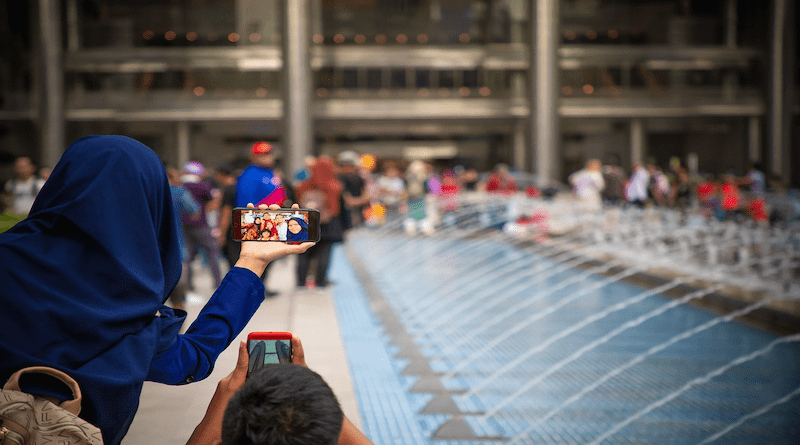Politicized Institutional Islam And Changing Malay Identity – OpEd
The integral balance between custom (adat), and Islam within the Malay persona has radically changed over the last 40 years. Politicized and institutional sanctioned Islam has swung Malay culture towards a form of socio-political compliance, on a scale never seen before.
Today in Kelantan, May Yong, a form of Malay traditional dance-drama, declared as an intangible cultural heritage by UNESCO in 2005 is banned, along with wayang kulit (shadow puppet theatre). These historical arts are banned in public due the Hindu-Animistic influence. Even Poco Poco from Indonesia is frowned upon in some states.
Over the last few months, a reversion to strict dress codes in public buildings has been reinstated. Warning have gone out from the Ministry of Tourism, Arts, and Culture that international celebrities who cross dress will be banned from performing in Malaysia. The bodies of Halle Berry and Jessica Chastain were blurred to ‘enforce modesty’ on TV3 Oscar reports.
This is indicative of the gradual shift away from traditional Malay values towards a politicized-institutionalized Islamic value system.
This has changed the way Malays behave socially, their body language, the way they greet others, especially the opposite sex, dress codes, and even language.
The Malay archetype has shifted away from ‘a Malay who is a Muslim’, to “a Muslim who is a Malay”. Thus, Islamic cultural values and rituals over the generations, replaced or superseded the Malay, which is an ‘Arabized’ Muslim paradigm.
This shift is best understood through the semantics of the Malay language. Malay greetings and phrases have been replaced with Arabic greetings and phrases. These Arabic constructs are changing the meanings, bringing in Islamic rather than Malay connotations. Selamat Pagi (good Morning), becomes Assalamalaikum, meaning peace be unto you. Malay culture was once constructed upon a sense of time within the kampong, Selamat pagi, tengah hari, petang, and malam.
These cultural constructs are disappearing. The Malay language now has a deep patchwork of Arabic embedded within the semantics.
Society has become much more conservative over the last few decades. One can go back and see the different language, dress-codes, and behaviour in bygone cinema movies of the 1960s, and compare that with the dress-codes of today.
The majority conform and wear baju kurung and tudung as a dress-code in workplaces and offices today. Not doing so, would estrange one from their peers. Malay men go to the mosque to pray, making a statement in the way they dress – ‘Arabized’ or wearing a tradtional kain or sarong. A bruise on a man’s forehead now symbolized piety and devotion to God, that some are very proud to show.
This is an indication of the institutional and peer expectations of society today. Conformity and compliance are so important in Malay culture today, not going to Friday prayers in Selangor, a state Pakatan Harapan took over in 2008, will land you with an RM 1,000 fine or six months in jail.
Malay culture has evolved into an ‘Arabism-Islamic’ archetype, that ‘virtue signals’ one’s values to the rest of the community. This has occurred through generations of education focusing upon Farhdu Ain, focusing upon prayer and reading of the scriptures, rather than Farhdu Kifayah, emphasising Islam as a sense of duty towards God, family, and the Ummah.
Being a Muslim hinges upon dress, following rituals, and timetables in public.
This is strongly supported and reinformed by the Federal, state, and local governments, where politically institutionalized Islam has thrown out secularism within government. This bolstered by patriarchs and peers within communities.
This politicized institutional Islam has radically changed Malay cultural traits over generations. Where Malays, were once a very inclusive people, who welcomed inclusion and assimilation, the values of today encourage suspicion and separation of Malays from other groups who are different from them. The Malay culture of today encourages social isolation. Those Malays who don’t follow rituals and dress codes are ostracized from the community.
There have been undercurrents of hate and institutionalized hostility towards Non-Malays, and members of fringe communities like LBGTQ, etc.
This hatred is being fanned by certain political quarters, which use to their advantage.
These new cultural viewpoints are stamping out the passion for life, colour, artistic creativity, and empathy Malays once had for others. Malays were once the most generous and friendly cultures in the world. This has been eliminated in the need of political expediency to keep a small group in power.
Those who have reservations about where Malay culture is going, must hide their reservations, in fear of being labelled, ‘anti-Malay’, ‘anti-Islam’, or a ‘liberal’. Mass compliance gives the impression, the whole Malay community is agreeable with how their culture has evolved. However, this is not the case. However, force and coercion, prevents any discussion upon where Malay society should go. Its always drowned out by ‘ultra’ narratives.
Malay culture once had great diversity, which is being suppressed. This is creating a one-dimensional society. Even Anwar Ibrahim’s new government is conforming to this track, rather than bringing diversity back into Malay culture.

